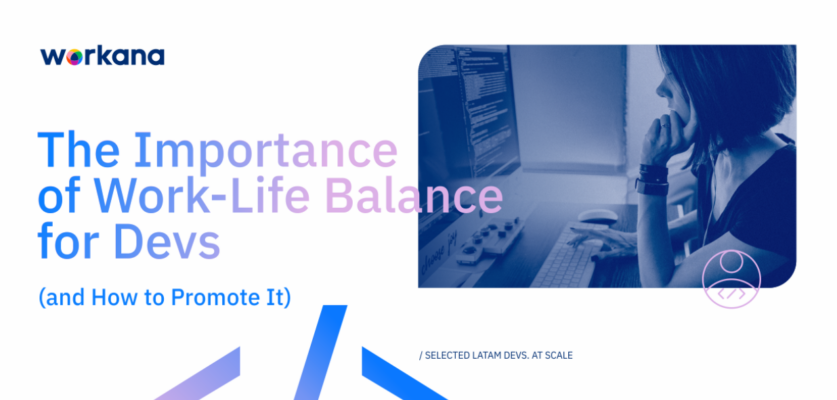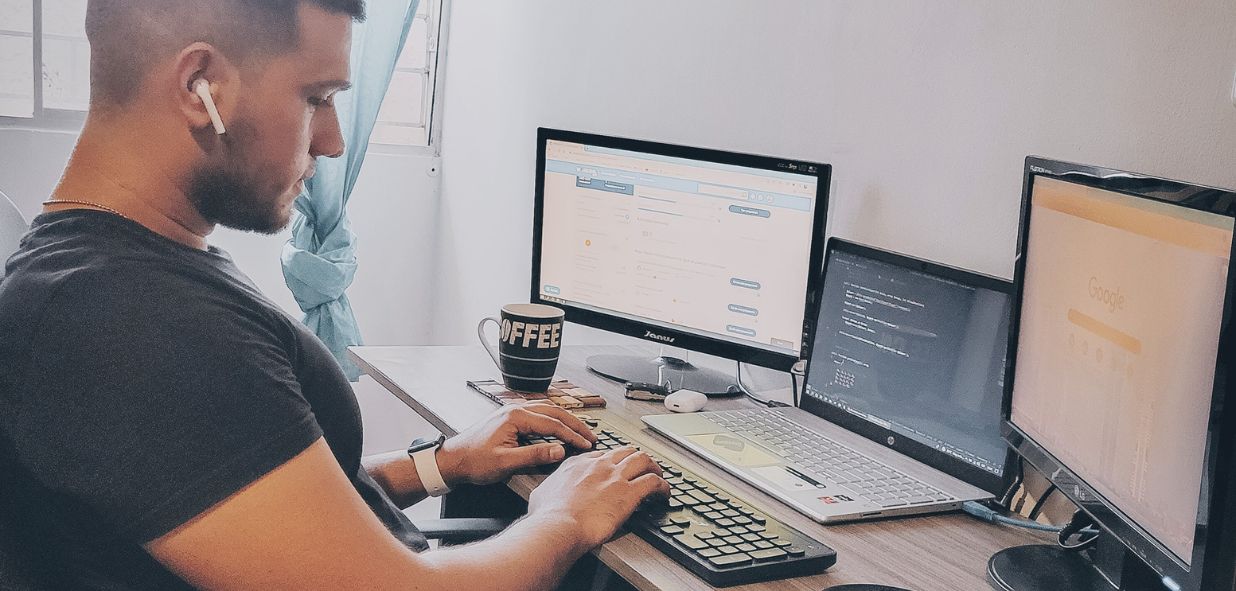Maintaining a good work-life balance is increasingly necessary and also becoming more and more complicated. This is especially true with the advent of digital technology, remote work, and labor market competition.
No matter what you do or where you work, work-life balance is important for everyone. However, developers who work remotely and the companies that hire them have to pay special attention to this aspect because software development is mentally taxing. It requires high levels of concentration and “fresh minds” to solve extremely complex problems.
Given the nature of their work, developers tend to be more likely to experience physical and mental health problems, a lack of motivation, and burnout. These problems don’t just affect them as individuals; they also affect the companies they work with. As a result of the absence, productivity decreases, and employee turnaround increases.
Luckily there are plenty of things you can do to create positive synergy and good habits that are focused on maintaining balance. We’ll talk about how employers and devs can work together to ensure a good work life balance for everyone involved.
What does a healthy work-life balance look like?
A lot of times, not even we know what work-life balance looks and feels like. According to time management experts like Laura Vanderkam or Shawn Achor, striking a healthy work-life balance has the following characteristics:
- All the other aspects of life are functional and fulfilling (family, friends, sports, self-care, rest, healthy eating, etc.)
- There’s enough time to do things that you enjoy and improve your wellbeing outside of work
- There’s space for individual talent to develop and improve
- Productivity goals are reached at an increasingly efficient rate
- The person has control over a routine that’s flexible but sustainable
How Can You Promote Work-Life Balance Within Your Remote Dev Team?
1.- Establish realistic goals
If your dev team always needs to work extra hours in order to achieve the objectives, this means that your goals aren’t realistic or your team isn’t working efficiently. Extra hours as a rule and not an exception aren’t sustainable at a professional or emotional level. That’s why it’s important to have a clear idea of what is and isn’t realistic within a healthy work schedule.
Setting realistic goals does more than impact the workload. It also accommodates for unexpected events and difficulties that inevitably happen and cause complex issues that delay the entire project, especially in the tech world. That’s why it’s important to expect the unexpected and always have a plan B on hand that won’t overwhelm your devs.
2.- Workflows and clear communication
One of the best ways to help your devs “leave the office” on time is to prevent errors caused by misunderstandings, endless meetings that could’ve been emails, and unnecessary information triangulation or silos.
Having a collaborative workspace where everyone can see the project’s progress, who has to turn in what and when, and good communication practices is vital. You’ll also want to establish information access as part of a company philosophy that recognizes how valuable each collaborators’ time is.
3.- Regulate self-management
It may seem counter intuitive, but bad self management isn’t just a lack of commitment or dedicating enough time to the work. It’s also spending too many hours without taking any breaks and the inability to abstain from working ahead when it’s unnecessary.
The eight-hour work day and five-day work week is still the standard, despite many countries migrating toward four-day work weeks with six or seven hour work days.
Regardless, it’s proven that the human brain isn’t designed to concentrate on the same task for more than two hours. Past that point, the ability to focus takes a nosedive. To make matters worse, spending more than 45 minutes consecutively in front of a screen can cause significant eye strain.
Therefore, it’s important to take the necessary measures so your devs don’t spend eight or more hours straight on a code without taking any breaks in between.
4.- Establish clear availability limits
One of the biggest drawbacks of remote work is that people keep answering messages or getting emails after the end of the work day. It’s shown that these types of “reminders” that the work isn’t done yet, even if they don’t need to be answered right away, prevent the brain from disconnecting and relaxing.
In other words, if you want to let your team know something, don’t send them a message during dinner. It’s better to schedule it to be sent out when their work day begins.
5.- Prioritize efficiency over effort
Do you prefer working with a collaborator who puts in a lot of effort to achieve their goals or one who achieves them with relative ease? Maybe the immediate results are similar, but the collaborator who always puts in a lot of effort is at a much higher risk for being unhappy at work, decreasing their productivity, and even leaving the company if they’re not fired before then.
A company culture of overexertion goes against work-life balance. On the other hand, companies that reward efficiency, finding ways to do the work better in less time, and who praise instead of reprimand workers who leave on time because they leave on time are worse off in the long run.
6.- Promote positive relationships on the team
The most effective team building activities are designed for the team to communicate and work more efficiently. They also allow team members to get to know each other better, empathize, and understand the actual human being behind the employee and, in this case, behind the screen.
Starting the work day with people who we like gives us more job satisfaction, and it’s a way to make the most of work time in order to build the social relationships that we all need.
7.- Give a little extra as an employer
Beyond establishing efficient methods and sensible work schedules, having a company culture that’s 100% respectful of a collaborator’s time and fostering positive relationships between team members, every dev is responsible for practicing good work-life balance habits. But that doesn’t mean you can’t put in a little extra effort to facilitate things even more and show how much you care.
This little extra morale-boosting effort includes providing resources for mental health, self-care, time-management skills, etc. It can include workshops, memberships for different services, ergonomic chairs, or even a weekly newsletter with tips for achieving a better work-life balance.
You can decide on what to provide. The most important thing is that your devs see that you’re showing an active interest in promoting their wellbeing beyond the work environment.
At Workana, we know that no matter how great your work environment is, you won’t achieve your objectives unless you have qualified, reliable collaborators on your team. We want you to hire the best devs for the dream team that your project needs. That’s why we find the most skilled talent for you and select it from the widest cross border talent pools. We even offer a seven-day risk-free trial so that you can create your crew knowing that you have the best people on your side. Ready to get started?
You may also be interested in:
- The Advantages of Employing Cross-Border Hiring for Your Startup or Company
- How to create a remote work policy for your developers
- The Seven Best Practices For Managing and Communicating with a Remote Development Team
- Six Hacks for Achieving the Best Company Culture Within Remote Development Teams
- 5 Benefits of Using a Talent Consulting Firm









